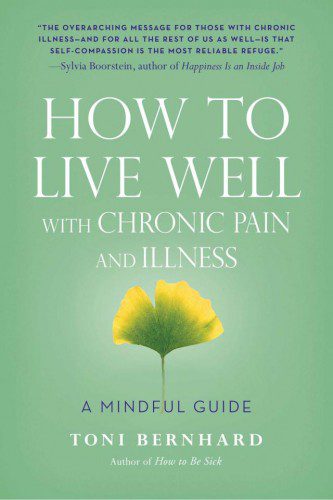 I wrote a prepublication endorsement for Toni Bernhard’s latest book: How to Live Well With Chronic Illness and Pain:
I wrote a prepublication endorsement for Toni Bernhard’s latest book: How to Live Well With Chronic Illness and Pain:
As a psychotherapist treating chronic pain, I wish this book had been written years ago. This is an invaluable guide for anyone touched by these challenges.
This is Bernhard’s third book. In a sense she has already shown has to live well in her previous book, How to Wake Up: A Buddhist Inspired Guide to Navigating Joy and Sorrow. Her current book is more specifically focused on people who suffer with chronic illness and pain and is designed to help these people no longer suffer. It is not that this book can cure the conditions that give rise to the suffering but to transform the mental and social conditions that actually give rise to the suffering.
Her voice is clear, friendly, and deeply personal. We are guided by Toni’s experience as a person with an unexplained and debilitating chronic illness. I have my own chronic pain condition but it has not been debilitating. There are limits to what I can understand from a deep experiential perspective. Bernhard does understand and she brings this knowledge at a practical, field-tested level. This book is a treasure trove of advice, wisdom, and pragmatic information.
She takes on sensitive subjects that beset the person with chronic illness, especially those conditions that are invisible to an observer and that wax and wane. It is hard to run one’s life with that level of uncertainty. Of course, this uncertainty is at the core of human experience. Chronic conditions illuminate this essential truth and in this way they can give us an inside route to awakening. While your health may be compromised, you can be a whole person because who you are is not dependent upon conditions within our without you.
How To Live Well covers vast ground, from topics such as how to interface with medical providers, well-meaning but often ignorant friends and family, and dealing with symptoms.
She gently shows us how to take responsibility for ourselves and to empower self-care in response to others. Particular helpful issues are dealing with other’s expectations that you should be well. This is often well-meaning but wishful thinking. Others may offer opinions about how god is involved in the condition—either causing it or offering it as a challenge for you to undertake. Unless that happens to be your particular worldview, such comments are usually unwelcome, hurtful, and useless.
I particular enjoyed the section on loneliness and appreciate her journey from loneliness to solitude that was occasioned by the increased amount of time alone from her illness.
Because Toni is writing from her own experience, this book avoids giving pat answers that may fit most people or are only relevant to people without chronic illness. For example, she has a chapter on sleep and she juxtaposes the received wisdom of sleep hygiene with the reality of how she has to cope. For example, sometimes she takes naps; sometimes she isn’t able to get to bed or wake up at the same time.
Much of this book is like giving you a permission slip to be yourself and be more accepting of your condition. Acceptance can make all the difference between suffering and equanimity in the face of limitation, distress, and uncertainty.
I read How To Live Well dipping in first to sections that caught my attention and then jumped around to fill in the rest. The book lends itself to this sort of reading or you can start at the beginning and work your way through.
This book is written for the person with conditions of chronic pain and illness and will also be useful for the clinicians that treat these people. For clinicians, How to Live Well can help to inform, inspire, and instruct you on how to better serve your patients with chronic conditions.
Order your copy now. From Wisdom Publications and available wherever books are sold.

